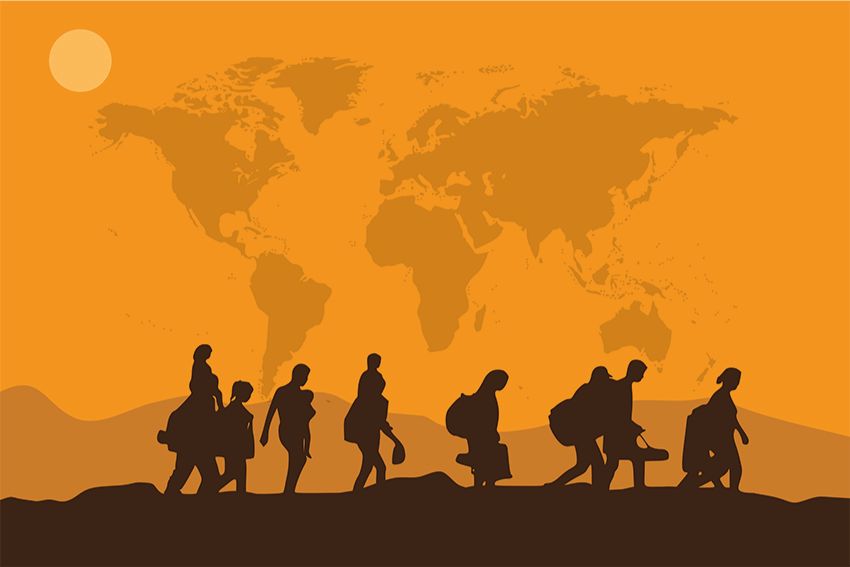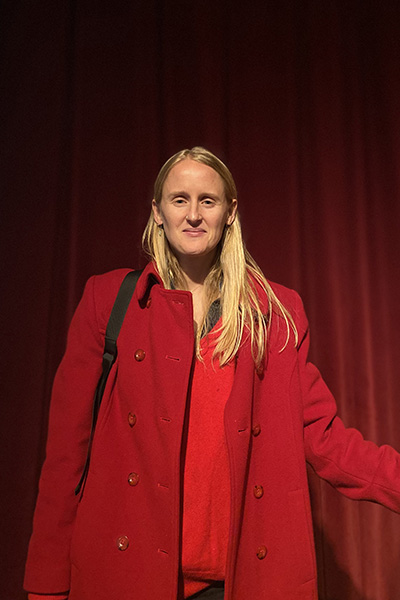- Apply
- Visit
- Request Info
- Give
University Hour shares stories of migration
Written by Marcus Grant
Published on November 13, 2023

Post-colonial political and economic struggles were the topics of a University Hour talk at Eastern Connecticut State University on Nov. 8. These conditions push people to search for opportunities in other countries. In 2022, 112.6 million people were forcibly displaced worldwide; of those, approximately 58,400 were able to depart for resettlement, according to the United Nations High Commissioner for Refugees (UNHCR). Eastern students came together to hear the stories of those who have suffered in pursuit of safety and comfort in a presentation by Madeline Baird, anthropology lecturer.
Baird researches the conditions migrants from South and Central America face as they make the long journey north in the hopes of finding asylum in the United States. She also examines the impacts migrants have had on a local level. Her research is a part of her anthropology graduate studies at the University of Connecticut and the College of the Southern Border in Mexico and the Gorgas Institute for Health Studies in Panama.

“It is very easy to lose the individual when they get buried in statistics,” said anthropology Professor Mary Kenny. “Stories serve to maintain the memories of those who endure (the harsh conditions of migration).”
Opportunities for people to migrate are shaped by their nationality, class and ability. Baird noted that their move to the U.S. “often starts months, if not years, before reaching the border.” In order to reach North America, people often trek more than 5,000 miles over land, a journey that can cost more than $10,000.
“Refuge for those who need it most is effectively ‘beyond reach,’” Baird said. “It pushes migrants to conditions of ‘illegality.’”
Baird shared the story of Sara, a 38-year-old woman from Venezuela, who was traveling in pursuit of more possibilities for her children, upon her completing the 10-day expedition through the Darien Gap in Panama.
The Darien Gap is considered to be one of the most dangerous places in the world, with a myriad of venomous animals living in the dense jungle and the constant threat of drowning as a result of fast-flowing rivers. Increasing numbers of migrants have been crossing through the dangerous border of Columbia and Panama, rising from 3,051 people in 2013 to 408,972 people as of September 2023.
With Sara were her four children — two 2-month-olds, a 5-year-old, and a 9-year-old — and her husband. “’It doesn’t serve me to go alone,’” Sara told Baird in an interview. Along the way, through the Darien Gap, Sara, carrying her 2-month-old, was separated from her daughter.
Baird told the audience that Sara, after escaping the jungle, went from camp to camp looking for her daughter. “’I remembered her at every moment, praying to God that she would be all right,’” she said. The pair were reunited.
In the days after crossing the Darien Gap, her children became ill as a result of dehydration and malnutrition.
Baird drew attention to the lack of resources migrants can take during their travels. “If they bring suitcases with them, they leave them in the forest” as they realize that they cannot continue with anything more than a backpack.
In addition to a lack of food and water, migrants also face extreme violence. Because these migration paths are treacherous, they go entirely unpoliced, allowing criminal groups to target the vulnerable migrants during their journeys.
“It really calls into question the human rights of these people,” said Baird. “Which are being upheld and which go completely ignored?”
When asked, Sara told Baird that “she felt she had no (human) rights at all.”
With her work, Baird encouraged students to look for ways to advocate for people looking for asylum in the United States and globally — to think critically about policies that “shape migrant’s lives” and to use their voice to bring attention to the treatment of those who want better for themselves and their family.


